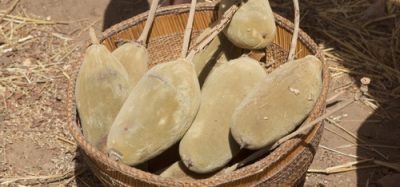Alternative proteins: feeding people need not cost the earth
- Like
- Digg
- Del
- Tumblr
- VKontakte
- Buffer
- Love This
- Odnoklassniki
- Meneame
- Blogger
- Amazon
- Yahoo Mail
- Gmail
- AOL
- Newsvine
- HackerNews
- Evernote
- MySpace
- Mail.ru
- Viadeo
- Line
- Comments
- Yummly
- SMS
- Viber
- Telegram
- Subscribe
- Skype
- Facebook Messenger
- Kakao
- LiveJournal
- Yammer
- Edgar
- Fintel
- Mix
- Instapaper
- Copy Link
Posted: 18 November 2024 | Miranda Knaggs | No comments yet
Miranda Knaggs, Corporate Development Director at Pioneer Group, outlines the current state of protein production and discusses the transformative potential of alternative proteins in revolutionising sustainable food production.


The global food system is pushing the planet to its limits. Agriculture now occupies nearly half of the world’s habitable land, drains 70 percent of our freshwater reserves, and is responsible for around 30 percent of the greenhouse gases fuelling the climate emergency.
Despite this massive environmental toll, one in ten people globally remains undernourished, unable to access or afford a nutritious diet.
But there is a solution on the horizon. In Pioneer’s latest briefing note – written in conjunction with the alternative proteins sector community including the Good Food Institute, National Alternative Protein Innovation Centre, Bezos Centre for Sustainable Protein, Food Standards Agency, Advanced Food Regulation, Growing Kent and Medway, MAST Consulting, and IChemE – we explore the groundbreaking potential of alternative proteins, how they can revolutionise sustainable food production and dramatically reduce environmental harm, while addressing the urgent social and economic challenges of global hunger.
The current state of protein production
As the foundation for muscles, skin, enzymes and hormones, protein is one of the body’s most vital nutrients. An estimated one billion people worldwide suffer from inadequate protein intake, causing health issues like swelling, fatty liver, skin degeneration, increased infection severity and restricted growth in children.
Our current protein production system leans heavily on livestock farming, which takes a massive toll on the environment; livestock farming drives deforestation, consumes enormous amounts of water and releases significant greenhouse gas emissions. Without more sustainable protein sources, we cannot feed the increasing global population and maintain a healthy planet.
An alternative way
According to research carried out by the Good Food Institute, alternative proteins such as those produced from plants, algae, microbes, insects or animal cells, fermentation (eg, fungi and microalgae) and cultured meat, require fewer inputs such as land and water, generate far fewer greenhouse gas emissions and pollution, and lower the risk of zoonotic disease transmission.
If we want to sustain the increasing global population, shifting to sustainable alternative proteins can significantly transform our food system to become more sustainable and resilient.
Alternative proteins in healthcare
It is also worth noting that alternative proteins have applications that extend beyond food production. Based at our BioCity Nottingham site, Phenotypeca is an innovative biotech startup and generator of the world’s largest collection of diverse baker’s yeast strains. The company is enabling improved yields and precision fermentation capability for its customers by pioneering the enhanced use of its platform for animal-free recombinant protein production.
Breathing new life into the use of baker’s yeast for medicine manufacture, Phenotypeca’s unique work combines the breeding of naturally diverse yeast strains with next-generation genomics techniques. This revolutionary approach is addressing some of the world’s biggest healthcare challenges by making the manufacture of recombinant proteins faster, cheaper and animal-free, while also reducing the overall impact on the environment.
The challenge ahead
The UK’s independent Committee on Climate Change has called for a 20 percent reduction in meat and dairy consumption to hit Net-Zero carbon emissions by 2050 — a shift that could enhance food security, promote healthier diets, protect biodiversity and build resilience. With this in mind, and building on the foundational work of the 2022 whitepaper Alternative Proteins: Identifying UK Priorities, Pioneer’s latest briefing note calls on policymakers, industry leaders and consumers to embrace alternative proteins as a key component of such future food strategies.
We know that the journey ahead is challenging. Emerging regulations, consumer hesitation, limited production capacity, investment needs, varying feedstocks, and the technical complexity of recreating the taste and texture of meat are all significant hurdles.
Tactical actions
Our industry briefing note was created in collaboration with the alternative proteins sector community during a one-day workshop held in June 2024 at Pioneer’s Wilton Centre. Over 40 representatives from industry, academia, funding bodies, investors and policymakers attended.
Together, we have identified ten tactical actions that we believe can be achieved within the next two years. Pioneer is dedicated to advancing sustainable food systems and we are taking several steps to support and achieve the goals outlined in our briefing note.
We will leverage Europe’s largest network of scientists and technologists, uniting experts from the Pioneer community, our wider network and the industry through in-person events, online panels and roundtable discussions. We will also regularly bring together those responsible for driving the actions highlighted in the briefing to review progress and share updates.
The community that contributed to this briefing, alongside Pioneer, remains committed to collaborating with key stakeholders to accelerate the growth of the alternative proteins sector.
About the author


Miranda Knaggs is Corporate Development Director at Pioneer Group, a specialist life science infrastructure and venture-building company focused on creating ecosystems that help companies accelerate cures for human and planetary health challenges.
Related topics
Alternative Proteins, Environment, Food Security, Ingredients, Plant based, Proteins & alternative proteins, Research & development, Sustainability, The consumer, World Food









